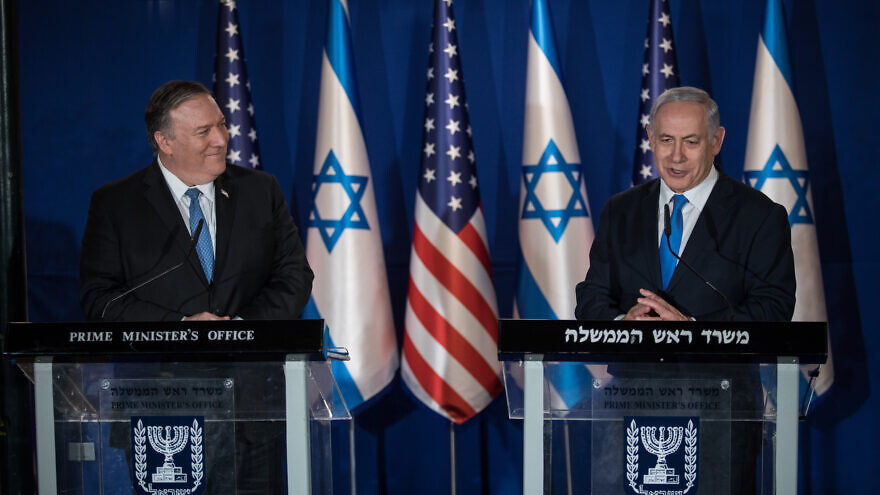Experts weighed in on the U.S. State Department’s announcement on Monday that the United States is softening its stance on Jewish settlements in Judea and Samaria.
It is a reversal of the 1978 State Department legal opinion, known as the Hansell Memorandum, that such neighborhoods are “inconsistent with international law.”
“Calling the establishment of civilian settlements inconsistent with international law has not advanced the cause of peace,” said Pompeo. “The hard truth is that there will never be a judicial resolution to the conflict, and arguments about who is right and who is wrong as a matter of international law will not bring peace.”
Eugene Kontorovich, director of the Center for International Law in the Middle East at George Mason University’s Antonin Scalia School of Law, labeled Monday’s announcement as “a major development in U.S.-Israel relations” in that the Hansell Memorandum was “legally inaccurate and long-outdated.”
“It is not the job of the United States to draw Israel’s borders; neither is it to tell Jews where they cannot live.”
“The U.S. now correctly takes the position that Israel is not an occupying power in the West Bank, and Jews living in Judea and Samaria is not a war crime. This does not close the door to a two-state solution,” he continued. “It does mean the negotiations about such a solution will no longer begin from the premise that Israel has no claim to this land or stole it from the Palestinians. That false legal theory only served to harden Palestinian positions and make successful negotiations impossible.”
Moreover, he said, “proponents of the claim that international law regards settlements as illegal have always defended their position with the circular claim that the entire international community agrees with it. That claim can no longer be made with any seriousness.”
Israeli Prime Minister Benjamin Netanyahu said he is “deeply grateful” to the Trump administration for its policy shift.
“Today, the United States adopted an important policy that rights a historical wrong when the Trump administration clearly rejected the false claim that Israeli settlements in Judea and Samaria are inherently illegal under international law,” Netanyahu said in a statement. “The Trump administration policy is also correct in stating that those who have categorically denied any legal basis for the settlements not only deny truth, history and the reality on the ground, they also set back the cause of peace, which can only be achieved through direct negotiations between the parties.”
Similarly, Blue and White leader Benny Gantz applauded Pompeo’s statement.
Gantz said that this important statement once again demonstrates America’s “firm stance with Israel, and its commitment to the security and future of the entire Middle East.”
The announcement is consistent with the Trump administration’s support of the Middle East’s principle ally, including, but not limited to, recognizing Jerusalem as Israel’s capital and relocating the U.S. embassy there from Tel Aviv; merging the U.S. Consulate General with the embassy; defunding U.S. assistance to the Palestinian Authority due to its support of terrorism; withdrawing from the 2015 Iran nuclear deal; and recognizing Israeli sovereignty over the Golan Heights.
‘Palestinian leadership has a lot to lose’
Jonathan Schanzer, senior vice president of the Foundation for Defense of Democracies, told JNS “this is consistent with what many legal scholars have long been arguing: That the West Bank settlements don’t squarely fit within the framework that their critics have provided.”
“I don’t believe this is the end of the debate,” he continued. “This administration will be challenged, certainly publicly, although the ability to challenge this will be limited.”
The move comes a week after the United States criticized the European Court of Justice to require products coming from Judea and Samaria, eastern Jerusalem and the Golan Heights not to be labeled “made in Israel.” Specifically, it noted the Psagot Winery case.
The European Union representative said that Brussels’ policy on Israeli settlements remains the same. “All settlement activity is illegal under international law, and it erodes the viability of the two-state solution and the prospects for a lasting peace.”
“Last week, the European Court of Justice shamefully mandated a discriminatory labeling regime exclusively for Jewish goods from disputed Israeli territories,” said Brooke Goldstein, executive director of the Lawfare Project, in a statement. “By weaponizing consumer protection laws in pursuit of an anti-Israel political agenda, the E.U. made its position clear. It required American leadership to stand up for what’s right. Today, the United States recognized Jews’ right to live in our historic homeland. The contrast could not be more clear and the timing cannot be coincidental. We’re thrilled to see the United States recognize reality and clearly articulate its commitment to justice and equality under the law.”
‘Provides incentive for Palestinians to engage in negotiations’
Matthew Brodsky, senior fellow at the Gold Institute for International Strategy, told JNS that the decision by the Trump administration should provide incentive to the Palestinians to engage in negotiations.
“For too long the Palestinian leadership has looked to disengage from the peace process in the hopes that someone else will make all of their wishes come true. The belief that wars, conflicts of attrition, the internationalization of the conflict, the Boycott Divest and Sanctions movements, the rising anti-Semitism on the Left in Europe and the U.S., and the creation of mythologies – all could be counted on to deliver Israel to the Palestinians, without Palestinians needing to negotiate or compromise directly with Israel,” he said.
“The Trump administration move recognizes reality in Israel and should provide an incentive for the Palestinians to engage in negotiations with Israel and stop relying on mythology and every other imaginable excuse not to come to the table,” Brodsky said.
However, Israel Policy Forum policy director Michael Koplow said Monday’s move is unhelpful in terms of the Israeli-Palestinian peace process.
“While the ultimate resolution of the West Bank should only be determined in negotiations between Israel and the Palestinians, granting an American green light to unfettered settlement construction throughout the West Bank will only make an ultimate resolution of the West Bank’s permanent status far more difficult,” he told JNS.
“I am also concerned that ignoring the international consensus on settlements will isolate not only Israel from the international community, but isolate the U.S. as well and will potentially provide Israel with the dangerous illusion that it has support beyond the narrow confines of this White House to unilaterally annex parts of the West Bank,” he continued. “I would far prefer that the U.S. maintain its position dating back four decades that recognizes the problematic nature of settlements under international law, while working with Israel to negotiate with the Palestinians for a solution that works for both sides.”
Nevertheless, Shoshana Bryen, senior director at the Jewish Policy Center, told JNS that the move provides an example of why the Palestinian boycott of the Trump administration is backfiring.
“Once again, the administration has shown the Palestinian leadership that it has a lot to lose by not engaging in serious negotiations with Israel,” she said. “It is not the job of the United States to draw Israel’s borders; neither is it our job to tell Jews where they cannot live. Secretary Pompeo has precisely threaded all three needles.”


























